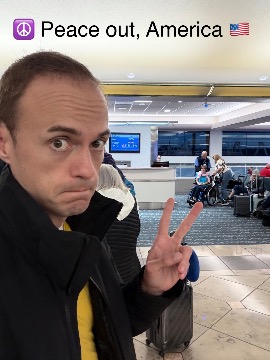Phone-free Field Trips
The degree to which we're constantly connected via our phones is well-documented, thoroughly-researched, and intuitively understood by over a billion people. But we tend not to do much about it, because the benefits of being connected seem far more concrete than the relatively intangible benefits of being disconnected.
This week, I was forced to reckon with this in a stark enough way to convince me to take action.
Lost in Translation
In the year 3 BiE (Before iPhone Era), I lived a nearly-entirely Internet-disconnected life for 7 months of adventures in Japan. I carried a dumb phone for emergencies, an electronic dictionary, and a camera. I didn't know the language well. I would regularly show up in a new city and start exploring, which led to me getting lost, which led to me having interesting experiences, which led to a flood of all sorts of creative ideas from my asynchronous brain.
I've been back to Japan 4 times since, in 2 AiE (After iPhone Era), 5 AiE, 8 AiE, and in the present year of 9 AiE. Each time, it's been easier and easier to pop in a SIM card and have nearly unfettered access to the Western world I'd—at least physically—left behind.
While my subsequent travels in Japan lacked the exhilerating experience of exploring and losing myself in an unfamiliar world, they were full of stressful decisions about which restaurants to eat at or which hotel to book online for the next city I'd be visiting. This was even more fun for my wife, who rather than be burdened by the occassional and minor fear of the unknown was liberated by an incredibly stressed spouse, navigating maze-like train stations in a hurry while reconciling the paradox of choice that perhaps we were dining at merely the second-best-sukiyaki joint in Kyoto.
(If you can't tell, I'm pretty pro at being hyper-aware of how awful the micro-optimizations that I've made for myself have made my overall life far less enjoyable. We all have our gifts, and hyper-awareness is mine.)
That is, of course, until…
…a few days ago my phone broke and my world collapsed around me. I spent the first day in denial. The second day in anger (sorry, everybody!). The third day (today) has been an exercise in bargaining (I'm typing this at the Apple Store in Osaka while I wait for the phone to be repaired at the risk I may receive a noisy Japanese replacement instead).
They told me to return in 90 minutes. That'd be 90 minutes without a phone. I'd merely have a MacBook and Apple Watch for an hour-and-a-half, in a city I actually know pretty well.
I was appropriately panicked. Should I stay in the safe confines of the admittedly crowded store? Should I brave the elements and walk through the Shinsaibashi shopping arcade? I'll go out, I thought, but in a straight line, so I can reliably return without getting lost, let's not get crazy here. I texted my wife to warn her I'd be disconnected for 90 minutes and waited for her acknowledgement before I left.
What happened next will shock you
I didn't die. I started noticing a lot of the little details of the world around me that I'd been blind to since that first trip I took to Japan, way back in 3 BiE. As I walked, I had the urge to reach into my empty pocket to snap a picture of the interesting things I saw.
Sadly, I had no camera, so I can't share a picture with you here in this post. Interestingly, I actually remember what I saw more vividly than I could had I outsourced the job to iCloud Photos. Fancy that.
Eventually I stumbled upon a toy store for infants and toddlers before remembering I am about to massively inconvenenience my very pregnant friend by staying at her house this week; perhaps I should buy her a gift. This thought would not have occurred to me had I been reading my RSS reader and getting angry about the latest thing Trump said. Instead, I bought a really nice, thoughtful gift! I'd been worried about finding a gift for days, and despite countless hours of sitting at my computer, I'd never found the time to simply go look for one.
What it's like to think a thought
After I checked out but before the gift was wrapped, I had to sit for ten whole minutes without a phone. It was initially disconcerting.
As I sat there with nothing to do, I had some interesting thoughts about the nature of stress in modern life. How very-immediate stressors are still quite effective because they approximate well-enough the conditions under which we evolved, but how more abstract stressors—for which everyone agrees our cortisol responses are ineffective—themselves vary dramatically depending on your life circumstances.
I reflected on how, back when I was wandering Osaka in 3 BiE, my abstract stressors were few but massive: I had hundreds of dollars to my name and tens of thousands in student loans; I had relatively poor job prospects; I didn't know if I still believed in a God or whether that doubt would send me straight to hell. But other than that, 3 BiE @searls had very little going on. Nobody needed me for much of anything. I got one or two e-mails a week. I had five or six things in my to-do list and they'd been dormant for months. I went to class, did my homework, and then did whatever I pleased. It's true, I was nearly constantly wracked with abstract stressors that dominated the back of my mind, but there were only 3 or 4 of them and at any given time, relatively few actions I could take to abate the worry. On a scale of 1 to 10, I'd have said my stress level was an 8.
Today, the @searls that stands before you in 9 AiE is in a completely different stage of life. All of the major, broad-stroke abstract stressors have long-since been resolved. I'm more successful personally and professionally than I ever dreamed I would be, and I'm incredibly fortunate to not have many long-term fears. However, my cadre of to-do apps runneth over with small-to-medium size things I know (and you know) that I'll never ever get to. I won't delete them, that'd be crass, but I will let them accumulate into the back of my head, until Apple announces a set of features for automatic history deletion alongside iOS 23 and macOS Mission. I feel constantly burdened with personalized requests for my time and attention by way of dozens of electronic vectors. On a scale of 1 to 10, I'd have said my stress level was an 8.
This is the first time I'd ever considered that there is an inflection point in the nature of stress over the course of our lives, and that mine just happens to have coincided with this Cambrian explosion of infinitely connected devices. Detangling the two concepts in my mind will take a lot of work, but if it hadn't been for this 90 minute walk, I'd never have thought of the analogy. Previously, I just knew my stress level was "about an 8" for the last decade of iPhones.
That was neat. I would like more thoughts
I think I'm going to make a habit of this, and I'd recommend you try it. Every week, I'm going to go somewhere relatively unfamiliar without my phone for a little while. I'll start with 90 minutes and see how it goes.
I suspect that "disconnectedness" is a muscle that our BiE ancestors didn't know that they'd been developing, because my ability to think and act clearly and decisively without confirming with information or humans via the Internet has been wholly compromised.
If my first few field trips go well, maybe I'll try going a little longer. Maybe someday I'll spend a whole weekend somewhere without the ability to contact anyone online. At the incredible rate our connectedness is increasing, I'm not sure how much longer such a thing will even be possible without breaking a law or surgically extracting an electronic implant.
If you read this and thought "maybe I should take a phone-free field trip", please give it a try! Find me here or on twitter and tell me how it goes!


